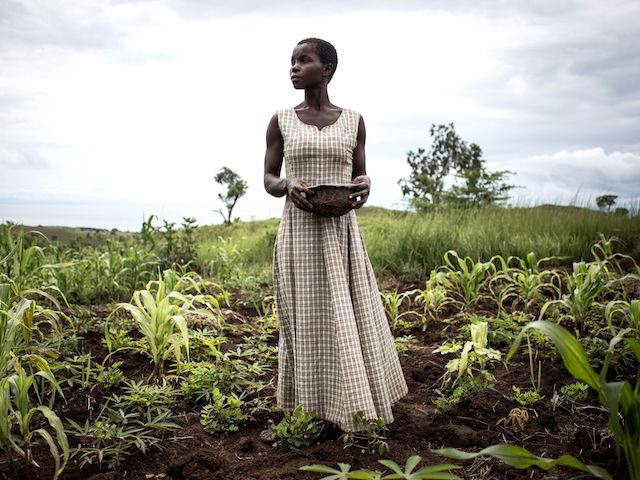Elite donors have forced a “Green Revolution” upon Africa in recent years that has failed to improve local agriculture sectors as promised and instead “increased farm input costs, farmer indebtedness, and inequalities among farmers,” environmental experts writing for the non-profit media outlet The Conversation reported on Monday.
Kristen Lyons, a professor of Environment and Development Sociology at the University of Queensland in Australia, and James Baofo, a lecturer in Geography and Sustainable Development at Kwame Nkrumah University of Science and Technology in Ghana, recently examined the impacts of the so-called “Green Revolution” on the Brong Ahafo region of Ghana, known as the nation’s “food basket” for its traditionally high yield of staple crops.
The academics wrote on June 14:
Our study found that international donors and philanthropic organizations were central in driving Green Revolution technologies in this region. Despite the hopes — and hype — pinned on this second Green Revolution, it has failed to address the needs of poor farmers. It hasn’t reduced poverty. Rather, it has increased farm input costs, farmer indebtedness and inequalities among farmers.
Lyons and Baofo refer to Africa’s recent Green Revolution as the “second” such upheaval because it follows an original wave of globalist agriculture reforms across Africa, South America, and Asia that launched in the 1960s.
“The first Green Revolution has been widely criticised on the basis of its adverse social and environmental impacts at the local level [sic]. Our study of the second Green Revolution in the Brong Ahafo region demonstrates similar trends,” the academics noted on Monday. “These practices of farming have increased the costs of production and put farmers further in debt. Poor and landless migrant farmers are hit hardest.”
The second “Green Revolution” theoretically aimed to help poor nations in Africa increase their yield of staple crops through agricultural reforms crafted by a cohort of international businesses, philanthropic donors, and wealthy foreign governments. The globalist-minded adjustments have proven costly for small-scale farmers in Ghana and profitable only for commercial farmers already dominant in their local trade sectors, the scholars concluded.
“Although new technologies may have increased yields, they have also raised costs of production — and there are no assured markets for produce,” according to Lyons and Baofo. “The [Brong Ahafo] region has no structured market systems that can ensure farmers generate an income from crops. With bargaining power skewed in favour of buyers, the prices of produce often disadvantage farmers — especially when farm produce is abundant [sic].”
Lyons and Baofo wrote in their joint study of Brong Ahafo, which was published by the Journal of Asian and African Studies on May 25:
Green Revolution technologies deliver a range of negative local-level socio-ecological impacts, including increasing the overall costs of production, as well as exacerbating poverty and inequality amongst farmers. Our findings demonstrate the disconnection between claims that Green Revolution technologies increase food security and income, and lived experiences of farmers.
The Alliance for a Green Revolution in Africa (AGRA) and the United States Agency for International Development (USAID) have collaborated in recent years to impose agricultural reforms on Africa. The Bill and Melinda Gates and Rockefeller foundations established AGRA in 2006.
Deutsche Welle (DW) — a state-owned broadcaster in Germany, which has publicly donated to AGRA — recalled last summer that AGRA’s original mission statement upon its founding in 2006 included an “objective of doubling the earnings of 20 million small farmers by 2020 while halving food shortages in 20 African countries.”
“The number of starving people in AGRA’s 13 partner countries across Africa is said not to have fallen at all but is reported to rather have risen — by almost a third,” DW reported in August 2020, citing data from a then-recently published study produced jointly by German and African development groups together with the left-wing Rosa Luxemburg Foundation.
“Meanwhile, agricultural output is purported to have risen at a slower rate than before ever since AGRA’s involvement began in eight of those [13 AGRA partner] countries [in Africa]. In two of those countries, it even decreased over that period,” DW noted.
The intergovernmental political forum known as the Group of Seven (G7) proposed a “new deal with Africa” on Sunday during a summit for the heads of state of its member nations in Brussels, Belgium.
The G7 leaders vowed to change their “approach to investment for infrastructure” in a post-Chinese coronavirus pandemic world, “including through an initiative for clean and green growth.”
“We are resolved to deepen our current partnership to a new deal with Africa, including by magnifying support from the International Monetary Fund for countries most in need to support our aim to reach a total global ambition of $100 billion,” the forum wrote in a press release issued June 13.

COMMENTS
Please let us know if you're having issues with commenting.